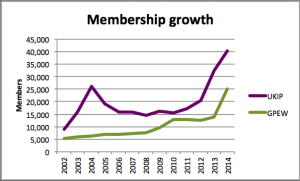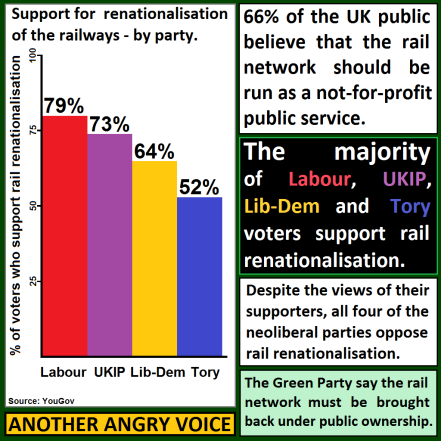For a long time I and many others have been guilty of treating UKIP with derision and scorn. We have seen similar responses to the far-right ‘loons’ elsewhere. Who after all doesn’t think Sarah Palin is barking mad? Who does not have nothing but contempt for the le Pen National Front in France? The answer, sad to say, is ‘plenty’.
The politics of protest have clearly changed since my youth; in fact since the Great Depression and the French Revolution really. Until recently, hard times always tended to benefit the progressive left. Many think this is why the Welsh Labour has never even wanted to remove the poverty of the valleys – it keeps them in power in Wales. But the times are a-changing. Partly because, I suspect, of Labour’s clear abandonment of any pretence to be the party of the workers, the poor and the disadvantaged, large swathes of the electorate are buying in to channelling their frustration and resentment towards immigrants, welfare claimants, poorly functioning public services. These are the issues dominating the political agenda. Allied to establishment bias in the media, the left-wing progressives struggle to get a look in.
We hear a lot about the Green Surge, but of course the UKIP surge has been even more impressive in numerical terms. In 2002 UKIP had 3500 more members than us, and despite fluctuations in between, the margin was actually smaller in 2010, with UKIP at 15500 members to our nearly 13000 members. UKIP have maintained an impressive surge since 2010, whereas we plateaued until the turn of this year. This leaves us currently 15000 members behind them today, and our growth rate is currently only slightly better than their this year. We are not going to catch them up any time soon.
Since the spate of 6 by-elections in November 2012 (which included Cardiff South & Penarth where Ukip scored 6.1% to just beat our 4.1%) there have been 6 further by-elections where Ukip ranged from 18% to 59.7% (ave. 32%) and we ranged from 0% (DNS) to 3.1% (ave. 2.7% in the 4 we contested)
And this has all happened against a backdrop of repeated charges of racism and sexism and assorted ‘idiots’ saying stupid things that you would have thought would have stopped this surge in its tracks. This is the now infamous ‘car crash’ interview on LBC, just 4 months before getting close to 60% of the vote in Clacton (which is in the LBC broadcasting area)
The small business spokesman mentioned, by the way, is now one of our Welsh MEPs.
So how should we see them? They are clearly well ahead of us in the polls and, although we can keep hoping their bubble will burst soon, there is no evidence of it being imminent. As Natalie Bennett points out, “What Ukip’s rise should do is provoke seriously soul-searching among our political class about why it has been able to get so far with its dangerous, divisive and damaging rhetoric, and been almost unchallenged. The three largest parties haven’t taken on Ukip, but all too often pandered to it, seeking to pull back Ukip voters by outdoing it in rhetoric and policy.”
She goes on to say: “This is not only morally wrong, but politically stupid. By pandering to Ukip’s stance on immigration and Europe, the three largest parties have helped to make its claims that immigration has “caused” low wages, has “caused” housing shortages, has “caused” crowded hospitals and schools seem plausible.”
Natalie dispels the myths of immigrants stealing our jobs (our pay and conditions are among the worst in Europe!), overcrowding our houses (600,000 are empty!), abusing our health service (they keep it running!), and scrounge our benefits (there are Brits doing the same thing all over Europe). But none of these things seem to have a lot of traction on the doorstep. UKIP’s nasty, simplistic ‘blame the foreigner’ message has been tried and tested before. Scapegoating is the easiest way for people to absolve themselves of responsibility for their own predicament.
People are waking up to the fact that their predicament is the result of successive generations putting all their faith in a narrow set of neoliberal policies prescribed as if there is no alternative by the identikit neoliberal parties. UKIP offers the attractive proposition that the reason it has all gone wrong is not your fault for keeping faith with the neoliberals, but the bloody immigrants’ fault for coming in and undermining it all. People that cling to this sort of analysis are not easily shaken.
So what can we do about it in those brief encounters on the doorsteps?
I believe that we need to simply keep pointing out the things that UKIP are ALSO about that nobody else is talking about. You can use this handy flowchart for example, making sure you get to the the bottom. In fact, cut to the chase and go straight to that last purple box. This is where people start to splutter a bit and start thinking UKIP may not be quite representing their interests.

(Created for HuffPost UK Comedy by @unnamedinsider, David Schneider and David Beresford)
You can then start thinking about what the Green Party offers that might appeal. Indeed research suggests (and this made me splutter when I first read it) that 73% of UKIP voters should actually support the Green Party when the do things like Vote for Policies.
This is the way to tackle UKIP voters. Engage them in issues that directly impact on them and self-interest will come to fore. A Green Left friend of mine, Martin O’Beirne, puts it well. “Interesting – I was of the belief that if you are of the ilk that vote UKIP, you must inhabit an orbit so far removed from green, there is no benefit in trying to appeal – But speak to people, working people, voting UKIP, not the hardliners, the kind of floating protest, jumping on a bandwagon type voters ( that have been manipulated by UKIP propaganda) and clearly they warm to green – even on the stance in europe – but it seems like such a paradigm shift for them to consider green – who they regard as ‘green’ perhaps? – but fundamentally the required paradigm shift exists because of an unfair playing field – e.g. the obscenely disproportionate airtime UKIP and Farage receive – BBC and Question Time”
I still struggle to respect UKIP politicians (hence my support for the Stand Up to UKIP demo) – but we have to learn to respect UKIP voters. Labelling them a bunch of racists just plays into UKIP’s hands. Most of the people contemplating voting UKIP have not voted for them in the past. They should be considered non-committed floating voters that we can have an impact on if we engage with them properly.
Now there is real challenge for us all!



all good except you fail you even mention the most obvious policy differences – pro-fracking, climate denying, anti-windfarm, anti-renewabe subsidies, pro-growth etc. These are issues I’ve found many more reasonable UKIP supporters are very uncomfortable with, and are our fundamental usps
LikeLike